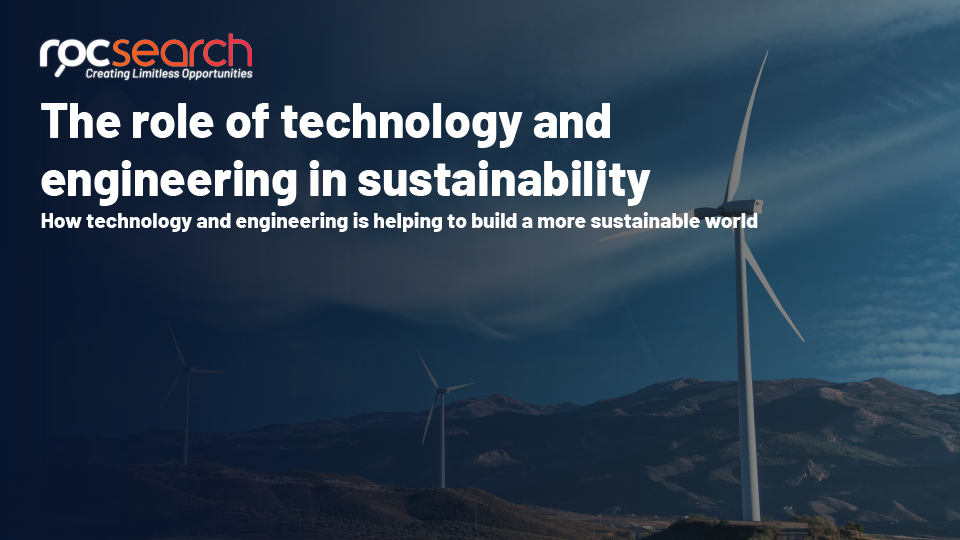The role of technology and engineering in sustainability
08 Jul, 202410 minutesIt’s no secret that technology – especially things like AI and cryptocurrency &n...

It’s no secret that technology – especially things like AI and cryptocurrency – are hugely energy intensive. Likewise, massive engineering projects can have their own negative impact, particularly on the local environment.
And yet, as with most things in life, it’s not that black and white. Because technology is driving important innovations in sustainability, and engineering projects are underway in the UK to build a better, more sustainable future. Let’s take an upbeat look at the role of technology and engineering in sustainability.
How technology and engineering is helping to build a more sustainable world
Let’s focus on energy, since the tech sector in particular has such a bad rap when it comes to energy consumption. But it might surprise you to know that tech companies are leading the way in renewable energy spending. In 2022, the tech industry accounted for 48% of all wind and solar power.[i]
On top of this, technology and engineering are enabling the wider digitisation of energy – which promises to help individuals, organisations and energy providers be more energy efficient. Some of the technologies adopted by the energy sector include AI (for example, to predict and manage energy demand), digital twins (to create models of energy grids to trial different scenarios and unearth new efficiencies), and the Internet of Things (such as smart home thermostats that help to cut energy usage). Plus, we can expect the energy sector to incorporate emerging technologies, like blockchain and generative AI.
We also have electric vehicles (EVs) now firmly in the mainstream, with most major manufacturers now offering EVs. Today’s environmentally conscious consumers are increasingly choosing EVs, and this choice wouldn’t be possible without technology and engineering efforts. And a certain someone called Elon Musk, of course. He may not be top of everyone’s International Treasure list, but the EV industry wouldn’t be what it is today without Tesla leading the way.
But what about the future of energy? This is where some of the UK’s biggest current engineering projects come into play. Take the Hinkley Point C nuclear power station as an example. Billed as the biggest environmental project in Britain, Hinkley Point C is the first in a new generation of nuclear power stations. It will deliver zero-carbon electricity to around 6 million homes, avoiding around 9 million tonnes of CO2 each year. There’s also the Thames Tideway Tunnel, the 25-kilometre-long, 7-metre-wide tunnel that’s designed to intercept, store and transfer sewage away from the Thames – thus protecting the river for generations to come.
What’s more, UK Research and Innovation – the governmental body that directs research and innovation funding – has invested in hydrogen and alternative low-carbon fuel research. At two Centres of Excellence,[ii] researchers will look at the potential for low-carbon fuels to decarbonise not just electricity generation, but also sectors like transport and manufacturing.
What should we be focusing on to ensure a better tomorrow?
With so many potential areas of focus – energy, transportation, industry, policy, to name just a few – envisioning a more sustainable future can feel like trying to climb Mount Everest. If Mount Everest kept getting taller.
But where do we think the brightest minds in engineering and technology should be focusing their efforts? For us, one key area is introducing more diversity into engineering and tech. Because with diversity of people comes diversity of ideas, more creative thinking, and a better understanding of the issues communities face. Attracting more diverse candidates into the industry, and attracting more diverse students onto engineering and tech courses should be a top priority.
Another focus point could be solving the renewable energy storage problem. It’s great that the energy sector is moving towards more renewable energy production, but solar and wind can only provide intermittent power, depending on the weather – and most renewable energy batteries can only store a few hours’ worth of energy at a time. We urgently need leaps forward in renewable energy storage if we’re going to achieve decarbonisation.
And of course we need new technologies and engineering projects to be designed with minimal environmental impact in mind. Sustainability must be baked into every stage of product development and project management.
Demand for tech and engineering talent is soaring
Given the challenges faced by businesses and society, it’s no wonder recruitment activity for engineering and tech jobs accounts for around 25% of all job postings in the UK. [iii] Demand for engineering and tech talent is off the scale.
It’s great news for engineers and technology professionals. (If that’s you, congrats. You’re hot stuff. Speaking from an employability perspective…) However, such huge demand can bring challenges for organisations looking to hire engineers and tech professionals.
That’s where Roc Search can help. As specialists in engineering and technology recruitment, we can connect you with the best talent in the UK. Let's chat about your hiring needs.





